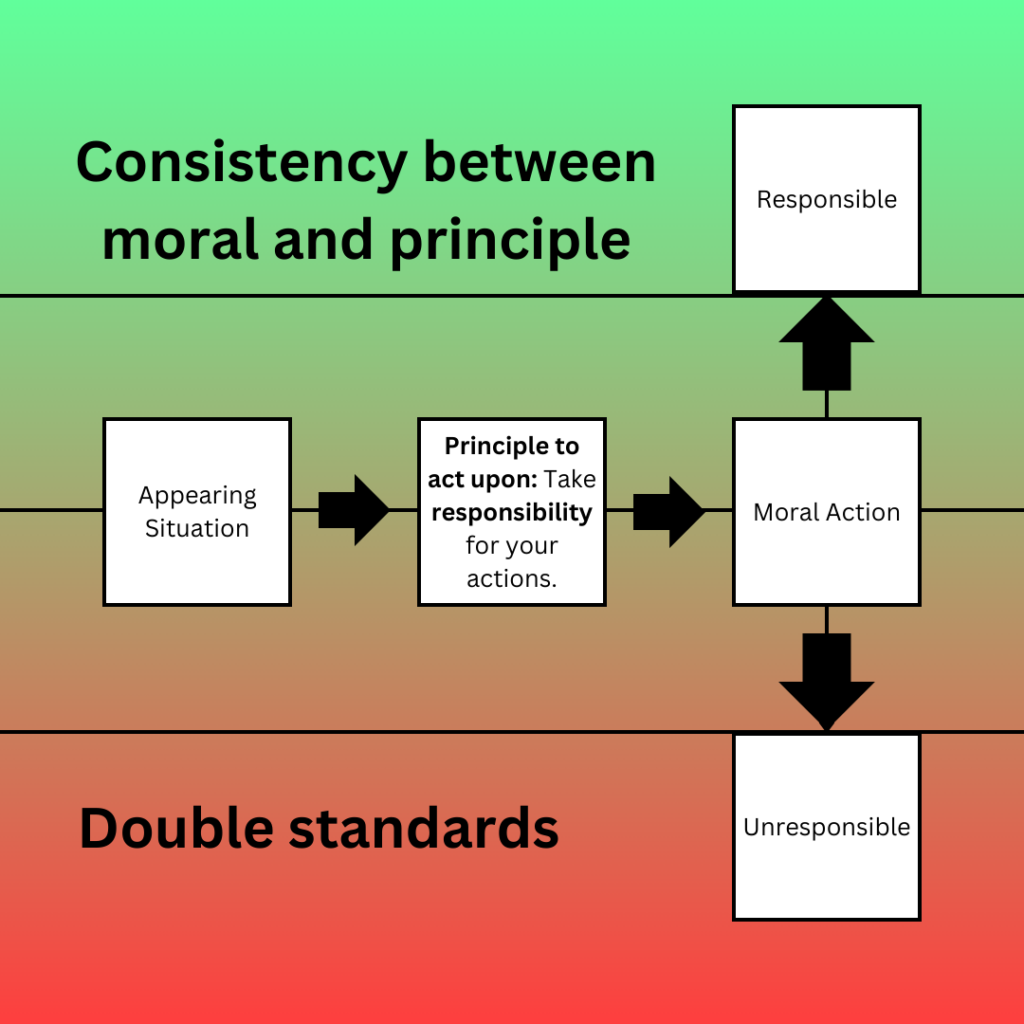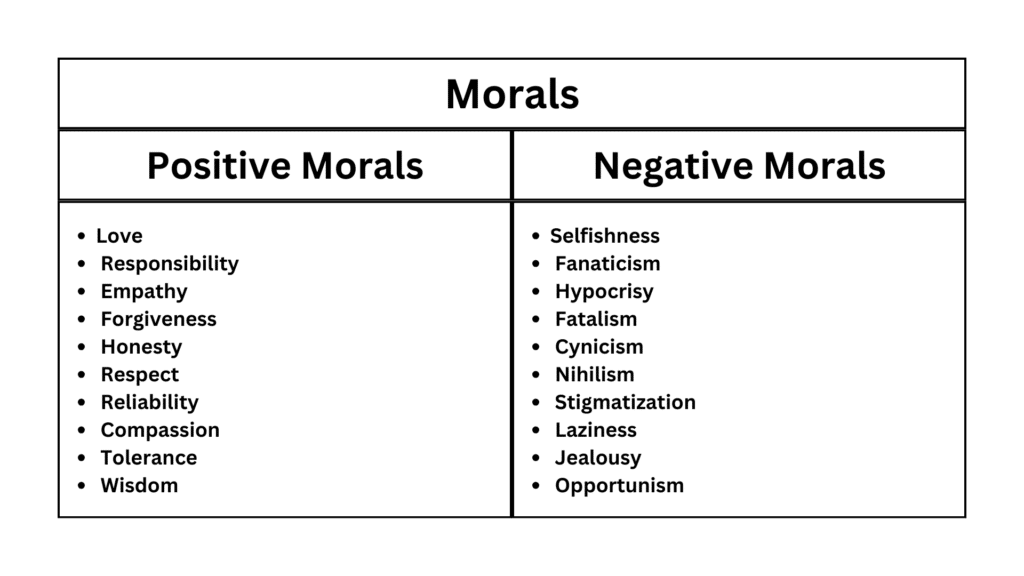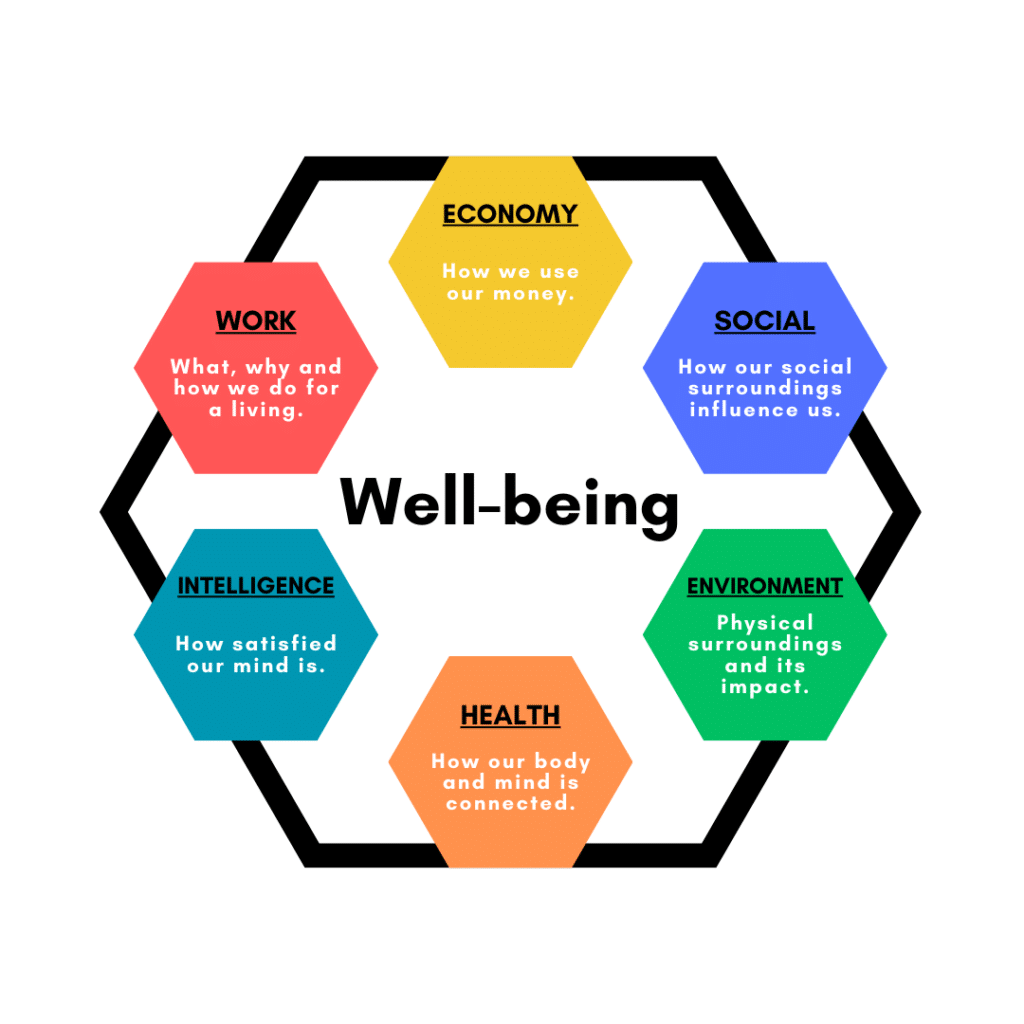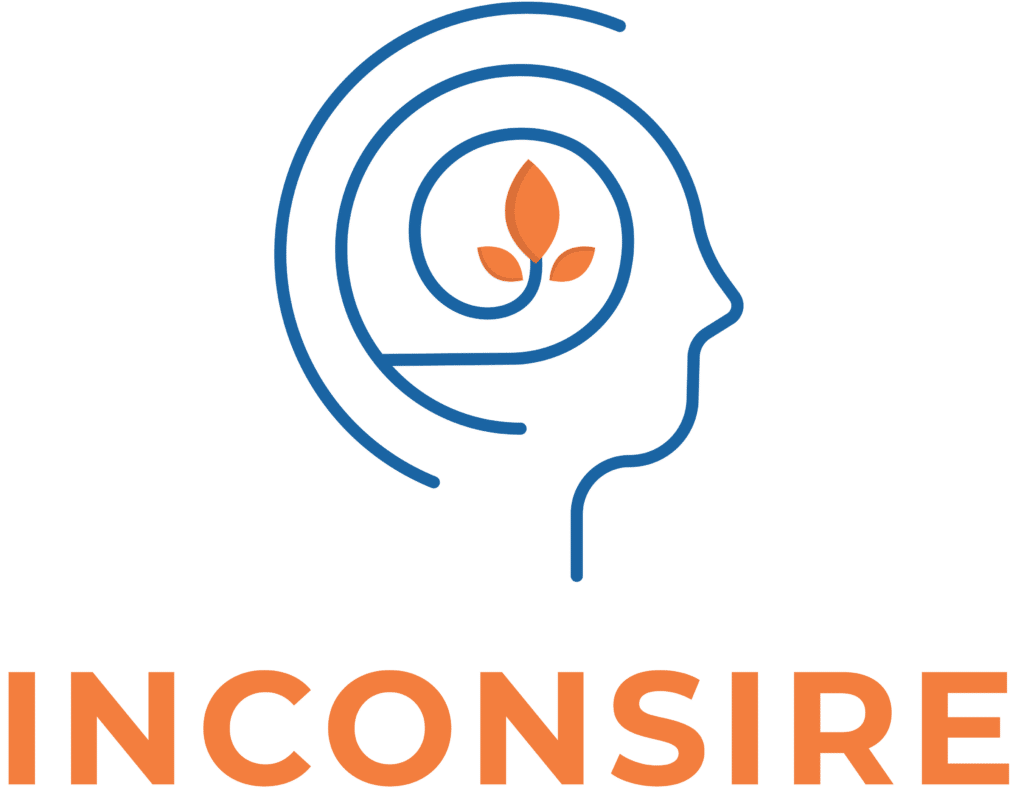Morals and principles are standards we set for ourselves to live by in order to achieve a life we find satisfying and meaningful. They serve as a kind of mental rulebook that guides us to live according to ideals (a standard or principle to strive for) we wish to act upon to achieve the desired outcome of how we want our actions to shape the world, others, and ourselves.
Forming a set of morals and principles is complex and requires us to continually reflect on them based on perspectives we gain over time and the convictions they provide. It involves finding principles that are not hypocritical, meaning we act in morally correct ways according to our principles and take responsibility for upholding them.
Situations arise that we must respond to. They come in various sizes and with different challenges. Some we are familiar with and can easily resolve, while others present new problems we need to address.
What makes morals and principles tricky is that we need to consider which principle we are acting from and what the morally right action is in the given context.
For example, if a situation arises where we have made a mistake, what is the right thing to do? Acting responsibly might involve admitting the mistake and learning from it.

This was just a very simple example, and the reason it can become complex is that there are many factors to consider. Over time, we become more aware of our actions and the morals and principles guiding them. In this discussion, we will explore the definition of a moral and a principle, how they are connected, what we should consider, the process of forming them, and what we can gain from developing strong morals and principles.
Definition of a Moral
Morals are our intentions behind our behavior—the purpose and meaning of our actions. They can also be referred to as our norms, values, and rules of conduct. They represent the standards we act from as the “norm.”
Morality refers to the intentions behind our actions and the standards that have been set. Morals are behaviors that can be acquired through practice, experiences, beliefs, and lessons learned.
Morals are often shaped through inspiration. Films thrive on telling stories with strong moral lessons. We often follow a protagonist who, in most cases, has good intentions and maintains their principles and moral foundations even during difficult times. An example could be a protagonist in a crime story who catches the antagonist responsible for terrible deeds but refrains from harming them because it would contradict their own moral standards.

The complexity of morals lies in the fact that multiple morals can be at play simultaneously in our actions. When we act morally, our intent is based on a specific moral, but it can shift or involve several morals at once. For instance, we may act from a place of responsibility, empathy, and tolerance when our children cry or when friends go through painful experiences.
Sometimes both positive and negative morals can influence our actions. We might be fanatical about something we believe is good, yet we should reflect on why we hold such strong convictions. This awareness encourages us to reflect on our actions and the morals they reflect.
Morals and Ethics
Morals define the foundation of our actions, which can be either positive or negative. Ethics, on the other hand, examines how morals are applied and whether they align with the norms and values set for them. Morals are not black and white, as multiple morals can be involved in our actions.
Ethics helps evaluate whether the moral basis of our actions fits the situation and the strength of that moral foundation. For example, shouting out of anger (moral) at someone doing something harmful may stem from care, but ethics would question whether anger is the right approach in that context.
Social conflicts often arise because there are limits to everything. If everyone were 100% sure of their actions and agreed all the time, there would be no conflicts. However, being completely honest about everything can sometimes cause unnecessary harm. Balancing honesty with compassion helps establish ethical guidelines.
For example, if a doctor called a smoker an idiot for not knowing smoking was harmful, they might lose their job. However, if the doctor understood how difficult quitting smoking can be, progress could be made in a more respectful way, which is the ultimate reason not to overstep ethical boundaries.
Morals and Emotions
Morals refer to the norms, principles, and rules that guide a person’s behavior and actions. They can be based on cultural, religious, philosophical, or personal beliefs. Morals are rational actions, often grounded in considerations of what is fair, ethically correct, or socially acceptable.
Emotions, on the other hand, are subjective experiences triggered by different stimuli or situations. They can range from joy, sadness, and anger to love, fear, and confusion. Emotions are impulsive and based on personal experiences and perceptions of the world.
The connection between morals and emotions is that emotions can influence how a person chooses to act according to their moral beliefs and vice versa. For example, empathy can motivate someone to act in line with their moral belief in helping others. Conversely, emotions like anger or fear can impair rational decision-making, causing actions that may contradict personal moral codes.
Morals can also influence emotions. Strong moral convictions can shape emotional intelligence. For instance, feelings of guilt or shame over past actions can motivate honesty and personal growth, encouraging self-reflection and emotional maturity.
Understanding the relationship between morals and emotions helps us build a life where our actions resonate with our values and create positive emotional feedback.
Definition of Principles
Principles define the connection between how we want to act in a given situation. We follow different belief systems depending on the context we find ourselves in. For example, when we are at work, we operate based on principles that shape our actions there. Conversely, when we are off work, we behave differently. Here are some examples of principles:
- Take responsibility for your actions.
- Forgive yourself and others for their behavior.
- Be empathetic when talking to others.
- Be honest with yourself.
- Always have good intentions toward people, even when they treat you harshly.
Principles can be inspired by various sources. They can stem from old proverbs or clichés that carry deep messages. They can also be influenced by people we find inspiring and their philosophies.
Principles and Rationality
To understand principles and how we create them, we must use a rational mindset. Rationality is the reasoning we listen to and act upon. It is the agreement between objective recognition and ethical values. This means being able to see things as they are, without our personal biases distorting the objective truth, and understanding the ethical values involved.
Through logical thinking, we connect actions with desires and purposes. For example, consider the rules for caregiving in a nursing home: When is it necessary for a resident to receive care? What do they want help with, and what do they prefer to handle on their own? To the staff, it might seem rational for residents to bathe every day, as they do themselves, but daily bathing could be exhausting for both staff and residents. Therefore, a compromise—such as bathing every other day—may be the best solution for everyone.
This is an example of rational thinking, where a fair balance is found between all involved parties. In contrast, if decisions were made purely emotionally, one might feel that receiving care is humiliating or unpleasant, which could lead to a decline in adherence to caregiving principles.
When forming principles, we must be rational. We need to recognize the value of something and see the bigger picture without letting personal biases interfere. This requires critical thinking about our own beliefs, analyzing situations objectively, and being constructive in how we interpret and apply our findings.
Principles and Well-Being
Principles are not only shaped by how we live our lives but also by the context we find ourselves in. When we examine different aspects of our lives, we can develop principles that are supported by moral actions.
For example, a personal life principle might be to always invite friends to social events. At work, we may have principles such as staying fully focused on the task at hand and ensuring that our work has a positive impact on others.

We may follow multiple principles to varying degrees, with some being stronger and more deeply rooted than others. Principles evolve over time as we refine our understanding of how we want to interpret different aspects of our lives. Sometimes, our beliefs about a principle fade, requiring us to find new principles that align with our evolving perspectives.
However, principles can also contradict each other. For instance, we might claim that family is our highest priority, yet work 80 hours a week, leaving us too exhausted to engage with our loved ones when we get home. This contradiction challenges the integrity of our principles.
For more information on well-being: Click here
The Interaction Between Morals and Principles
The relationship between morals and principles can be simplified as follows:
- Principles help us make decisions about how we want a situation to unfold.
- Morals help us commit to the principle we declare by guiding our actions based on moral convictions.
For example, if we have a principle of raising children to take responsibility for their actions, we can support this principle with morals such as respect, empathy, and honesty. Morals and principles go hand in hand. They create a solid foundation for how we interpret a situation and how we process it to achieve the desired outcome.
They help us define how to make our lives as meaningful as possible by establishing guiding rules that are reflected in our actions and their underlying intentions. They do this by answering the what, how, and why of our behavior:
For example, if we choose to live by the principle “Be kind to everyone you meet,” we must determine which moral actions support this principle. In this case, kindness (morality) can be defined through loving, tolerant, and compassionate actions.
The interplay between morals and principles is built by examining the details of our actions, identifying what works and what doesn’t. The stronger our reasoning behind our moral and principled convictions—without contradictions—the more just and fair our actions become.
If we discover that our morals and principles do not align with the context in which we apply them, we must acknowledge the discrepancy and adjust accordingly.
The Process of Creating Morals and Principles
We all have to start somewhere. On our journey to developing a solid set of morals and principles to live by, we must acknowledge our mistakes and shortcomings. Increasing our awareness of how our morals and principles affect ourselves and others is key. Over time, we gain a deeper understanding of how we interact with others in accordance with our principles.
When we establish principles, we must be able to adjust them by developing better moral behavior. Some principles—such as “never harm others” or “always have the best intentions toward everyone”—are excellent to follow. However, if others do not share our principles, we must be able to understand their actions while remaining steadfast in our own beliefs. That means we should not lose our footing just because others hold different views.
We build moral skills to navigate moral complexities and combine them with our principles to find rational solutions to our problems.
Be Careful with Doubt
Doubt can trigger emotional reactions. We may start speaking negatively about ourselves or others, or we may begin asking irrational questions to the point of exaggeration. Everyone experiences self-doubt and questions whether they are making the right choices, but this should not completely throw us off balance. We must regulate our self-criticism and emotions to a level that allows us to maintain our moral and principled foundation.
Be Rational
If we aspire to live a certain way, we must listen to our rational side. Rationality is a powerful tool that we must develop to manage both our emotions and our actions. We need to take time to connect the morals we want to embody in our principles and how they manifest in our behavior. There should be a clear connection between what we do, how we do it, and why we do it—always with the intention of achieving what we desire through our principles.
Accept and Acknowledge Mistakes
Denying our mistakes is wrong because mistakes are inevitable throughout life. We will always make errors that we must accept and acknowledge in order to learn from them. Admitting our mistakes may evoke strong emotions, and that is completely okay. It means we recognize the essence of our errors and their impact on ourselves and others.
Humans are not infallible. We will never be entirely rational, as our actions are often influenced by emotions. However, emotions are also a valuable tool for shaping our morals and principles, as they provide insight into how our actions affect us emotionally.
Ask Questions
A crucial part of our journey in developing principles and the morals that support them is asking questions:
- What do we want?
- Why do we want it?
- How do we want our morals and principles to shape us?
These are good starting points. As we answer these initial questions and find deeper meaning in them, we should ask more nuanced questions. These will help us develop a more solid and personal approach to life—one we can truly stand by.
Take Responsibility
To act morally in alignment with the principles we set for ourselves, we must take responsibility. We must always take responsibility for our actions and how we learn from them. Taking responsibility is what shapes our understanding of what it means to act morally based on a given principle and ensures that our actions are consistent with our beliefs.
When we face challenges, it is always our responsibility to handle them. This applies to everything from minor annoyances, like an irritating remark in traffic, to major mistakes at work. We must take responsibility for overcoming our failures and managing external influences.
We are also responsible for upholding the morals and principles we establish for ourselves. If we neglect this responsibility, we may face moral conflicts. To navigate these, we must understand both our own and others’ reasons for acting as they do. If we fail to acknowledge their perspectives, we cannot act authentically according to our own.
For more information on responsibility: Click here
Be Empathetic
Although morals and principles are often based on rational thinking, we must also recognize their connection to our emotions—with empathy being one of the strongest emotions involved. Empathy enables us to put ourselves in others’ shoes and understand their needs.
When it comes to helping others, it is not our job to dictate what they should do. Instead, we should seek to understand why they think the way they do and where their thoughts originate.
People are naturally reasonable and have an innate sense of right and wrong. However, factors such as upbringing, inspiration, and habits can shape behaviors in different ways. Social inheritance, for example, is a complex but understandable phenomenon. To truly understand why people are the way they are and how we might help them, we must ask why and approach them with empathy.
Empathy is a tool that helps us understand others, which in turn allows us to develop principles that can not only guide us but also help others.
For more information on empathy: Click here
Believe in Yourself
To manifest fundamental principles and morals, we must believe in what we tell ourselves. If we believe that “anything is possible” or “we are what we think”, we must fully understand what we mean by those statements.
Sometimes, we lose faith in ourselves, and this happens when we are not fully aware. When we act without awareness, we may not always live up to the morals and principles we set for ourselves. Simply being present and mindful is enough. Breathing exercises, for example, can help increase awareness and bring us back to the morals and principles we want to uphold.
Implementing Morals and Principles
We create morals and principles both consciously and unconsciously. Many of them are shaped by media, friends, family, culture, and other external influences. If we become more aware of the beliefs we have formed, we can establish morals and principles that we actively choose to follow.
Be careful about what defines your life. We do not need to have an opinion on everything—only on the things that truly matter to us. Morals and principles can also provide a sense of security when we face doubt. They help us establish self-respect and integrity, allowing us to accept our mistakes rather than tear ourselves apart over them.
Increased Emotional Intelligence
As we develop our morals and principles, we gain a deeper understanding of our emotional lives. We learn to recognize which emotions arise from our actions and external influences.
Morals and principles act as a guide for handling emotions and determining how we relate to them. They help prevent long-term uncertainty, which can be uncomfortable if left unaddressed.
Furthermore, they enable us to understand the emotions we want to experience daily in order to create an optimal life—and they help us identify the emotions we must manage in order to achieve happiness and meaning.
Strong Well-Being
Morals and principles help us find purpose in our actions and define what well-being means to us. Just as morals and principles help structure the different aspects of our lives, they also create a connection between these aspects, strengthening our overall well-being.
Our well-being is shaped by the values we prioritize, which are supported by the principles and morals we live by. Principles help define how we want to live and challenge our beliefs and assumptions. Meanwhile, morals reinforce our intentions, ensuring that our principles are upheld through our actions.
By thoughtfully crafting our morals and principles, we create a foundation for a life of integrity, purpose, and emotional balance.
